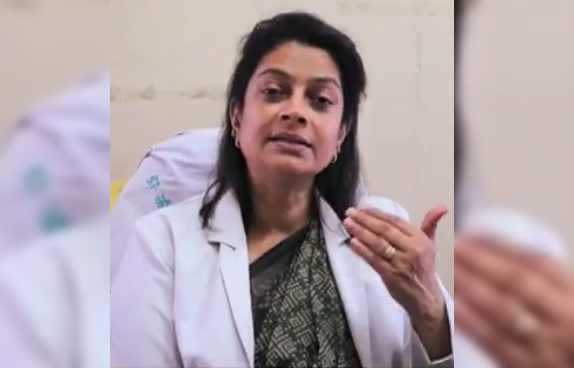“I am going bonkers”, or “I am getting Alzheimer’s”, is a common refrain one uses in response to pointers of one’s forgetfulness. The Alzheimer’s disease is however no joke. It is one of the most dreaded conditions wherein sufferers gradually lose the ability to remember anything and go on to becoming incapacitated to carry out even basic everyday tasks. Medical journals describe Alzheimer’s disease as a neurological disorder that causes the brain to shrink ( atrophy) and brain cells to die. Alzheimer’s is the most common cause of dementia. The disease has afflicted over 50 million people worldwide with US having over 5.8 million patients. India is not unscathed either with approximate number of patients being more than 4 million.
Even as another World Alzheimer’s Day went by on 21st September, I talked to Dr Manjari Tripathi. Professor, Neurology Department, All India Institute of Medical Sciences ( AIIMS), New Delhi, and President of Alzheimer’s Society of India, Delhi chapter, to know more about Alzherimer’s.
Some excerpts from the interview:
Q). Doctor Manjari, what is the approximate number of people afflicted with Alzheimer’s disease in India ? How do we compare with world figures?
Dr Manjari Tripathi : There are 4.5 to 5 million people with dementia in India. Mind you, this is the recorded figure. There are thousands of people who do not seek treatment and are thus unrecorded. Over 80 per cent of people with dementia have Alzheimer’s disease as Alzheimer’s as we all know, is the most common cause of dementia.
Compared to rest of the world, Alzheimer’s is rising in under-resourced countries as compared to countries where its risk factors have been controlled.
Q). Does India fall in what you term as “under-resourced category?” Do we have adequate diagnosis and treatment facilities for Alzheimer’s all over the country or are the treatment facilities concentrated in metros only?
Dr Manjari Tripathi : In India unfortunately many educated and well to do people also do not come forward to take the tests and get themselves treated. Diagnosis is also often met with denial and non- acceptance and so, in every step there is a hurdle. Most people think it is just forgetfulness and is a normal age related problem. So in our country public awareness is a must. True, memory lapses, forgetfulness can happen to anyone, especially busy people who are multi tasking, but there is a difference between Alzheimer’s patients and people who keep forgetting, as the latter category will remember the happenings or the people, if you remind them.
- Q) Does Alzheimer’s always effect people who are elderly?
Dr Manjari Tripathi : Alzheimer’s mostly effects the elderly but certain genetic forms can start at young age also. Alzheimer’s is not a part of normal aging but as you grow older the likelihood of developing Alzheimer’s increases.
Q). What are the various problems faced by Alzheimer patients? Is it just forgetting but other things also?
Dr Manjari Tripathi : They start out with decline in memory, visuospatial disorientation, difficulty in reading, writing, calculating etc. Initially there is forgetting of recent events or conversations, appointments and even names of family members. Patients in the initial stage find it difficult to find words to identify objects or express their thoughts. Slowly the memory deteriorates to severe impairment where the patients might forget to carry out everyday tasks, forget the way to their homes, forget to wear clothes, to take bath and so on.
Q). What is the line of treatment? How does one diagnose that the symptoms are those of Alzheimer’s and not just forgetfulness?
Dr Manjari Tripathi : Early detection, counselling and starting treatment is in the first line of treatment. Tests to diagnose Alzheimer’s include memory assessment, MRI or Magnetic Resonance Imaging, Brain Positron Tomography or PET scan, Computed Tomography or CT Scan etc. Then neurologists will check the person’s reflexes, speech, coordination, muscle tone, eye movement, mental cognitive tests and so on.
Q). Who are most vulnerable to be effected by this dreaded disease?
Dr Manjari Tripathi : Anyone who ages is vulnerable, as it is seen that Alzheimer’s generally effects people over 65 years. Having said that it must be remembered that Alzheimer’s is not a normal part of aging. Family history and heredity, head injury, heart problems, are some of the triggers. Also statistics has shown that Alzheimer’s effect women more than men.
Q). Are there any preventive steps one could take?
Dr Manjari Tripathi : While there is no total cure for Alzheimer’s yet, one can temporarily improve the condition or slow down the progression with medication and lifestyle changes. Adopting non -sedentary healthy lifestyle, eating healthy diet, avoiding too much oil in food, avoiding alcohol, quitting smoking, walking and doing other non- strenuous exercises, listening to music, social networking, undertaking brain stimulating exercises like puzzles, Sodoku, chess etc helps. Also helpful is keeping blood pressure, diabetes and cholesterol levels in control and sleeping adequately.
Q).The Alzheimer patients need round the clock attention, right ? How to take care of Alzheimer patients?
Dr Manjari Tripathi : Yes, round the clock caregiving is needed for Alzheimer patients. Lots of efforts have to be put in by the caregiver. Constant scheduled activity and engagement are required.
Q). Thank you doctor for educating us about Alzheimer’s.
Dr Manjari Tripathi: Thank you.










